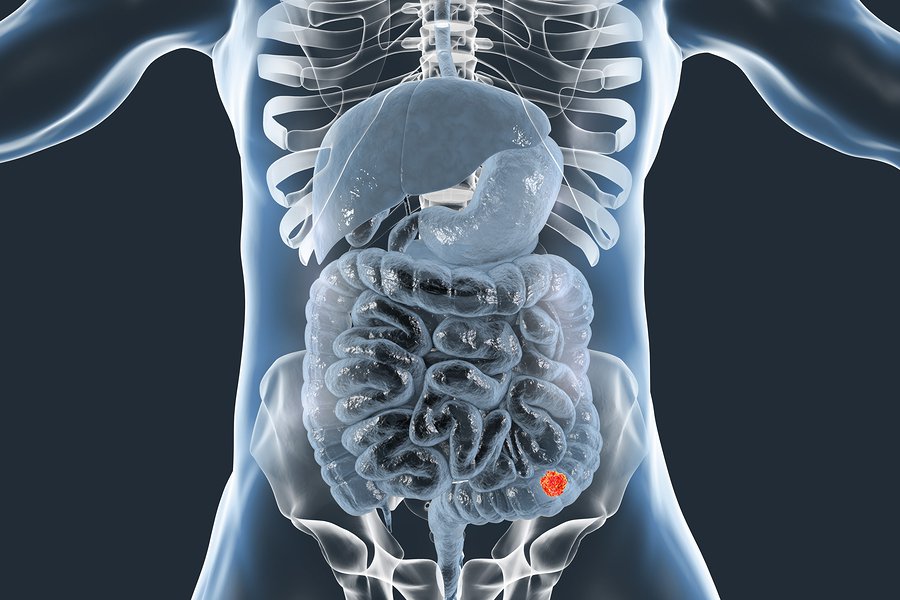Bowel cancer – symptoms, prevention and treatment
Bowel cancer is one of the most common cancers in the UK – here we take you through ways to prevent it and how to recognise symptoms and treatments
Bowel cancer, sometimes called colon or rectal cancer, is a general term for a cancer that starts in the large bowel – the lining of the colon or rectum.
It usually starts with small, benign growths that can turn malignant. If left untreated, the cancer may spread through the wall of the bowel and then onto the liver or lungs where it can prove very difficult to cure. If, however, the cancer is caught when just in the wall of the bowel then chances of eradicating it are much more effective.
AXA PPP healthcare’s Cancer Care Operations Manager, Nurse Evelyn Wallace and her team look at some of the most commonly asked questions.
What should I look out for?
The most common symptoms of bowel cancer are:
- blood from your bottom or in your poo
- loose or runny poo that is not normal for you and has been going on for more than 3 weeks
- loss of appetite or weight loss that is unexplained
- shortness of breath or extreme tiredness (may be symptoms of anaemia which can be a result of loss of blood from a bowel tumour)
- stomach pain
- a lump in the stomach.
If you feel that you have one or more of these symptoms then it is important to get yourself looked over by a health professional. It may not mean that you have bowel cancer but it is best to be cautious.
Who can get bowel cancer?
The older you are the more prone you may be to developing bowel cancer as the most affected age group is between 70 and 80 years.
There is a bowel screening programme run by the NHS which checks people between the ages of 60 and 74. The screening looks for polyps which are the growths that may possibly turn into cancer.
However, if several members of your close family have suffered from bowel cancer then your likelihood of developing it before the age of 50 is much higher.
That said; the majority of bowel cancers detected under the age of 50 are not due to genetics but those with pre-existing conditions such as Crohn’s disease and ulcerative colitis. These conditions may lead to developing bowel cancer as the lining is already inflamed. It is important for these individuals to be regularly monitored by a specialist so any changes can be picked up early.
You can find out more in our article on bowel cancer.
Is there a way to prevent it?
Studies suggest that eating lots of red and processed meats (such as bacon, ham, sausages, smoked meat, tinned meat and pâté) may increase the risk of bowel cancer. Those who eat more 2 or more portions a day are at the greatest risk. Those who eat less than 2 portions a week seem to be at the lowest risk of developing bowel cancer.
Eating poultry (turkey and chicken) do not seem to be associated with developing bowel cancer although the risk may increase if eating fried or grilled meat.
There is good evidence to suggest that eating a well-balanced diet, high in fibre is the best way to decrease your risk. Eat plenty of fresh fruit and vegetables and unrefined grains. Exchanging your white loaf for brown is a good place to start.
Find out more on eating to protect against cancer
In some instances your GP may recommend you take a low dose aspirin every day from the age of 50 as a preventative measure too.
What is bowel screening?
Some bowel cancers can be detected at an early stage through bowel screening. If you live in the UK you should receive screening automatically after your 60th birthday in England, Wales and Northern Ireland and after your 50th birthday in Scotland. The screening comes in the form of a test kit which you should receive in the post.
However, if you are at more risk of developing cancer of the bowel through family history then it would be sensible to request to be screened earlier.
Bowel cancer can be tested in 2 ways:
Home screening – this is a simple test that can be performed at home which looks for hidden blood in samples of your poo. The test requires you to collect 2 samples on 3 different occasions. It is then analysed in a laboratory.
Your results should be posted to you within 2 weeks. If no blood is detected then you will be sent a further test in 2 years. It is important to use the screening kit when you receive it as the earlier any cancer is detected the better the outcome.
You may have to repeat the test if any blood is detected or you may be referred to a specialist screening practitioner where a colonoscopy (camera test) may be offered.
A colonoscopy – First a sedative will be given and then a fibre optic endoscope will be passed through the anus to inspect the colon. This procedure will come with a full explanation and the specialist will be able to answer any worries you may have.
A colonoscopy will only be offered if your doctor believes it is totally necessary as it does come with risks. 1 in 1000 colonoscopies result in a perforation of the bowel and there may be bleeding after the biopsy.
Read more on bowel screening
What is the treatment for bowel cancer?
Depending on where the tumour is located and how advanced it is, surgery, radiotherapy and chemotherapy may be offered as treatment.
Early detection may mean that surgery alone will be able to remove the tumour, however, some for some patients the cancer may remain or return.
A patient may be given chemotherapy after surgery to make sure that no cancerous cells remain; this is usually offered in stage 2 and 3 bowel cancer. Radiotherapy (to shrink the tumour) may be used on rectal cancer and in combination with chemotherapy – it is not usually given for cancer of the colon.
Further treatment will be offered if the cancer has spread but if it has moved to vital organs (stage 4) then palliative treatments would be available to provide relief.
All of these treatments come with side effects but these will depend on the nature of the operation and which chemotherapy drugs are used.
What are the survival rates?
The chances of surviving all stages of bowel cancer have greatly increased in the last decade. Improved surgery, radiotherapy methods and new chemotherapy drugs have been developed and are still being developed to improve survival rates.
Read here on how to cope with a cancer diagnosis
Useful sites for help and support
NHS – Bowel / Anal cancer factsheet
Disclaimer
All content on Silversurfers.com is provided for general information only, and should not be treated at all as a substitute for the medical advice of your own doctor or any other health care professional. Silversurfers will not be responsible or liable for any diagnosis made by a user based on the content on www.silversurfers.com and we are also not liable for the content of any external websites or links from or to Silversurfers to any other websites. Please always consult your own doctor if you’re in any way concerned about any aspect of your health
Melina - Assistant Editor
Latest posts by Melina - Assistant Editor (see all)
- Asparagus and garlic prawn spaghetti - May 4, 2024
- Cream Cheese Orange Bars - May 2, 2024
- Top tips for hay fever sufferers - April 14, 2024
- Paysan Breton Cream Cheese Breakfast Wraps - April 12, 2024
- 4 Homemade Sweet Treats for Easter - March 24, 2024





















